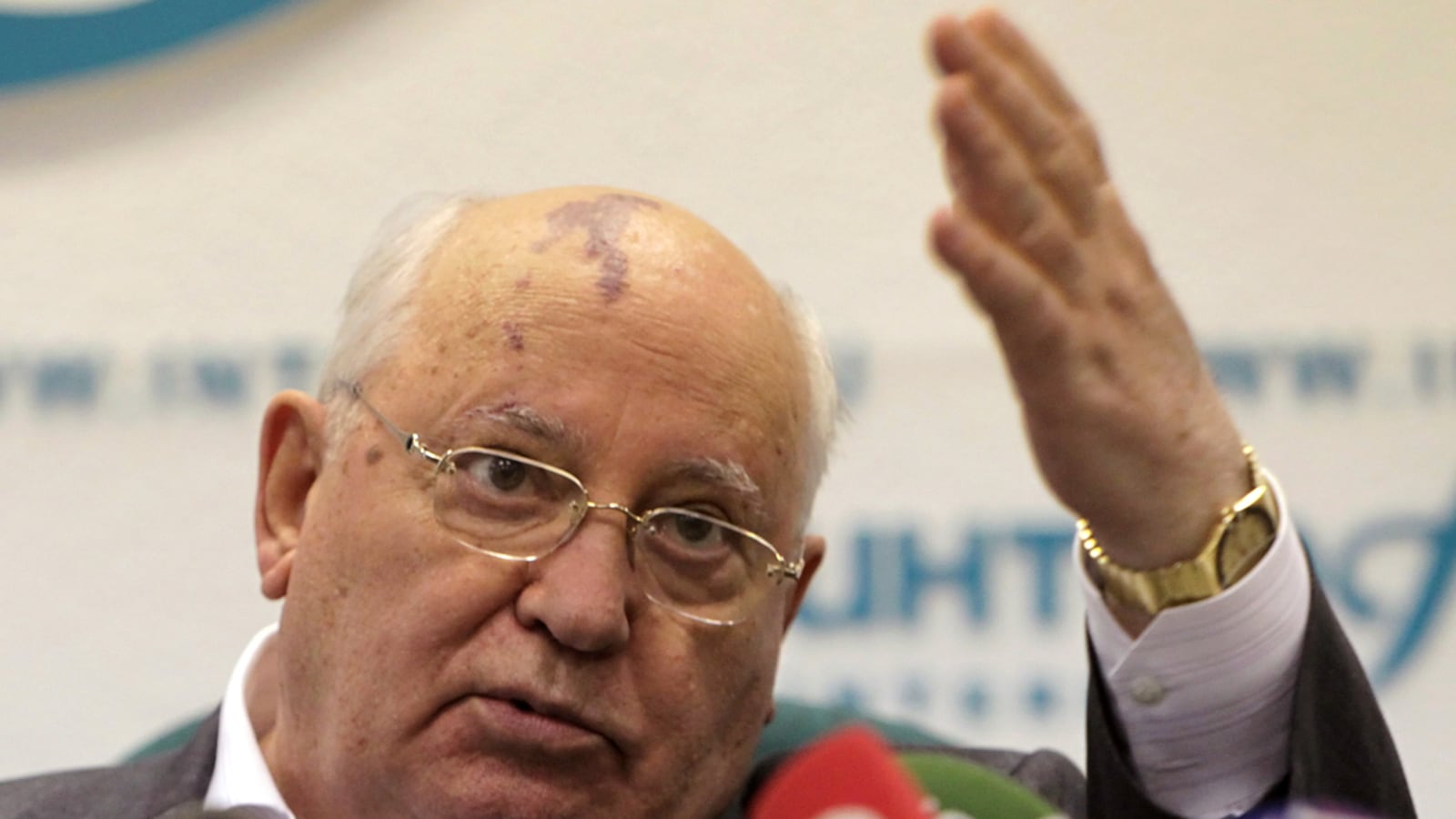It seemed like a good occasion to speak out. With the 20th anniversary of the collapse of the Soviet Union approaching, Mikhail Gorbachev, who has taken to criticizing Vladimir Putin and his political party, United Russia, more sharply than usual, compared Putin’s politics to Stalin’s.
Since Gorbachev turned 80 in March, he’s been worrying openly that his legacy in ending Soviet repression is under threat. This week, in an interview with Der Spiegel, the former Soviet leader said United Russia reminded him of the Communist Party and urged Putin not to return to the presidency in 2012.
Gorbachev accused the Russian prime minister of “dragging the country into the past, when it is on fire with modernization.” The father of perestroika said he thought Putin’s priority was preserving his power, not solving urgent problems.
Previously, on Radio Liberty, Gorbachev warned that the political mechanisms the authorities are creating in Russia are meant “to ensure they are not less creative managers than Stalin.” The old politician has reason to be concerned. Since the fall of the Soviet Union, authoritarian tendencies have spread across the former Soviet republics, with Freedom House rating only three of them “free,” seven “not free,” and five somewhere in between.
In the past week alone, Uzbekistan blocked the websites of Western media outlets, Ukrainian and Belarussian presidential candidates and civil-society leaders were jailed for opposing their presidents, and Russian opposition leader Boris Nemtsov was detained at a political protest in St. Petersburg. If Gorbachev were to start making changes today, he has said, he would begin with the same perestroika slogan: “It’s impossible to live this way!”

It took the old man 10 years to criticize Putin. He was busy writing his memoirs, delivering lectures at Western universities, and shooting ads for Louis Vuitton. But today, a few months before parliamentary elections in Russia, Gorbachev’s voice supporting Russian liberals sounds clear. “What can they do to him? Put him in jail or confiscate his property? That would look absurd,” said Moscow-based political analyst Igor Bunin.
Absurd or not, United Russia immediately jumped on Gorbachev’s promise last spring on Echo of Moscow radio never to help the party, “as they are slowing us down” and “cannot be reliable.” The party hinted at a lack of patriotism when Gorbachev celebrated his 80th birthday in London. United Russia also said Gorbachev was the one to blame for ruining the Soviet Union—though Gorbachev usually blames Boris Yeltsin, Putin’s former boss. In the past decade, the number of Russians who say they miss the Soviet Union has increased from 25 percent to 35 percent, according to polls conducted by the Levada Center. These days, only 10 percent of Russians believe that the August 1991 coup was a victory for democracy over communism.
The Kremlin’s press service has not responded to Gorbachev’s behavior, as his statements have mostly concerned Putin and United Russia, not the Kremlin or President Dmitry Medvedev. Indeed, when Spiegel asked Gorbachev about Medvedev’s liberal views, he referred to the president as “an educated man” who “needs powers he could rely on to solve the problems.” To opposition leaders, Gorbachev’s words sounded like a long-awaited breath of fresh air. “We need to open up windows to revive the country and move forward,” said Vladimir Ryzhkov, leader of the non-registered Party of People’s Freedom. To Oleg Kashin, a journalist severely beaten last fall in what he says was payback for critical articles about Kremlin youth groups, Gorbachev has become “the last moral authority left” in Russia—a kind of Aleksandr Solzhenitsyn or Andrei Sakharov of today.






